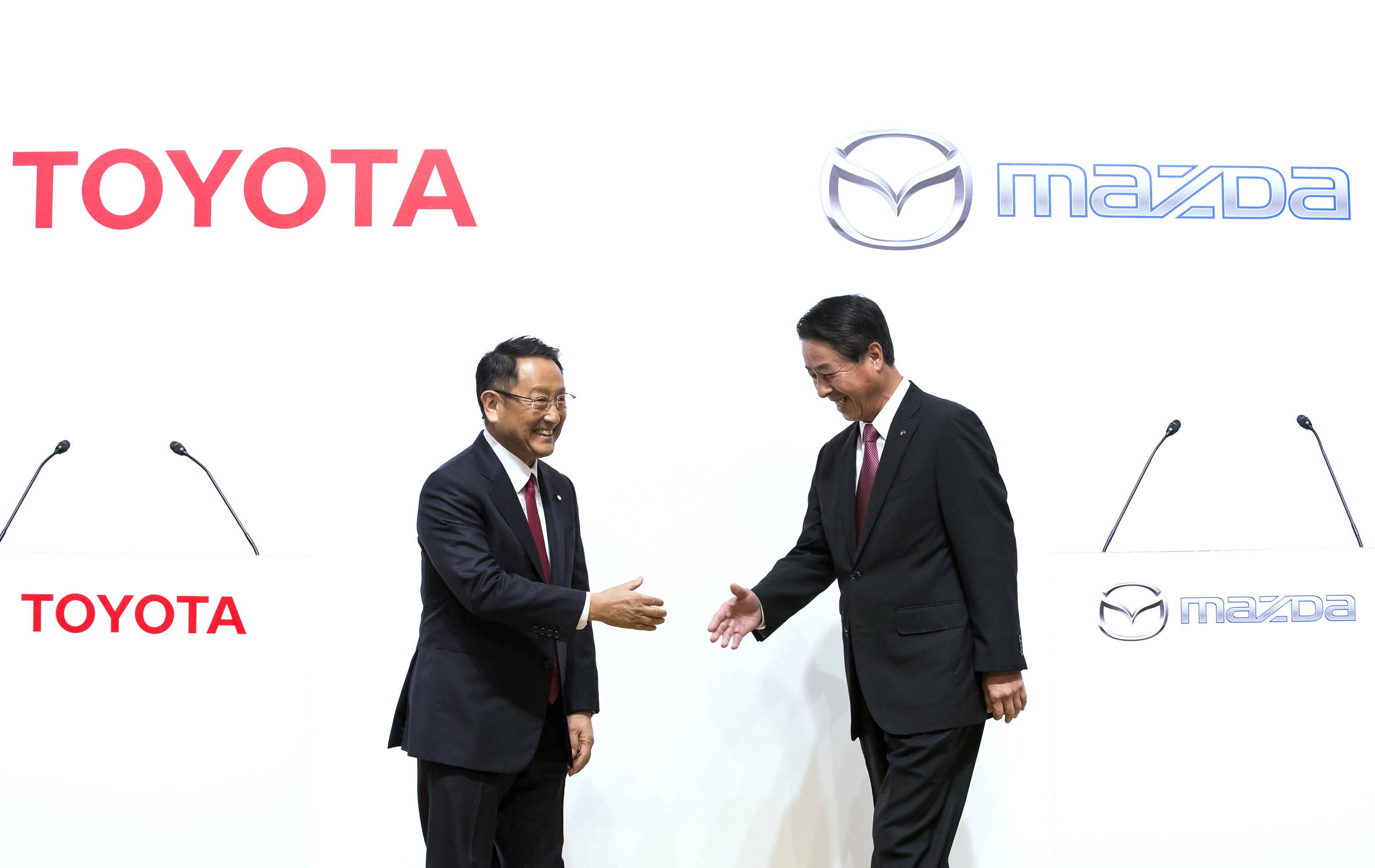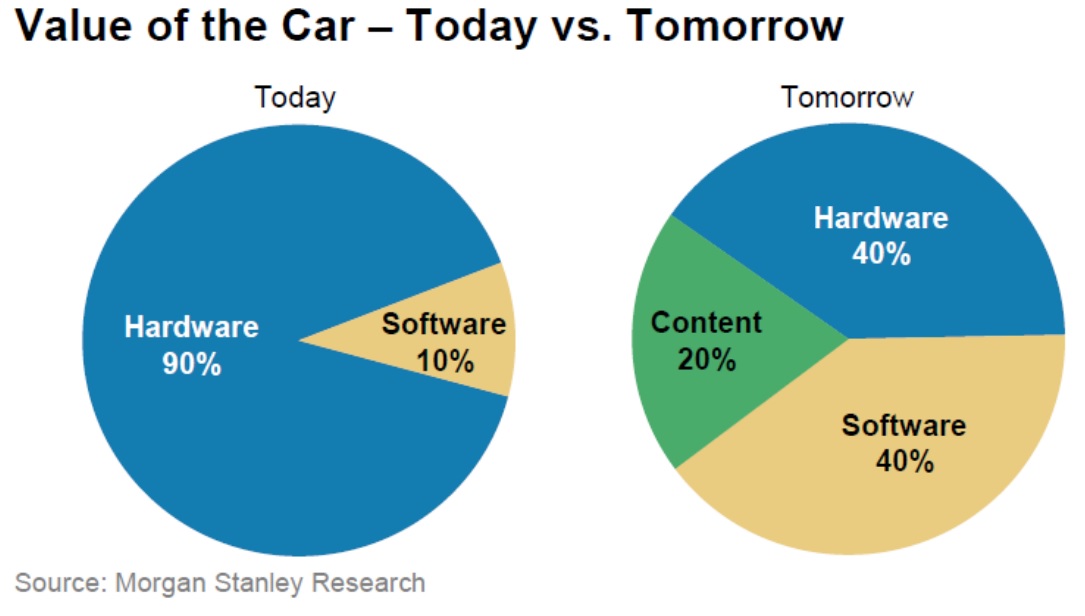Cars will become commodity. Do we even need to own a car in the future?
The automobile industry is in the midst of innovation that is sure to come in the near future.
Toyota and Mazda partnership announced
Toyota just recently announced a partnership with Mazda to build new crossover models. Also, they will work together to accelerate the development of electronic vehicles and connected vehicles. Two great rivalries now becoming a partner; this shows how desperate they are for the new ages of the automobile industry.
Toyota just recently announced a partnership with Mazda to build new crossover models. Also, they will work together to accelerate the development of electronic vehicles and connected vehicles. Two great rivalries now becoming a partner; this shows how desperate they are for the new ages of the automobile industry.

Source: https://www.cnet.com/roadshow/news/mazda-toyota-team-up-to-develop-electric-connected-cars/
It is exciting to see which OEM reaches or breakthrough to the new era first, but I would say that also leads to massive disruption of the automobile industry.
Car Sharing, Connected Car, Electronic Vehicle, and Autonomous Driving; the combination of these could lead to cars becoming a commodity. Do we need to own a car in the future?

There is a very interesting study that shows which options will be more economical.
- Rideshare is more economical if you drive less than 621 miles annually
- Carshare is more economical if you drive more than 621km, but less than 7,456 miles annually
- Owning a car is more economical if you drive more than 7,456 miles annually
It really depends on your lifestyle, but these number of miles in each category could increase in the near future. As we see the rising importance of information and software rather than the hardware per se, the automobile manufacturing companies would start losing the bargaining power to consumers as we see in the electronics industry. Cars have always been a mix of lifestyle and luxury, but the combination of car Sharing, Connected Car, Electronic Vehicle, and Autonomous Driving could cause a polarized gap to appear. In other words, car brands and model would only matter as a luxury car and as for daily usage, people would start caring less about the models or brands, but people would decide on the software installed in the car in the service.

Source: https://orfe.princeton.edu/~alaink/SmartDrivingCars/PDFs/Nov2013MORGAN-STANLEY-BLUE-PAPER-AUTONOMOUS-CARS%EF%BC%9A-SELF-DRIVING-THE-NEW-AUTO-INDUSTRY-PARADIGM.pdf
How could traditional OEM (i.e. automobile manufacturing company) survive?
As commoditization (i.e. less differentiation amongst brands) of the automobile as a product proceeds, current OEM would face low profit margin, being forced to get into the price war. Only focusing on the hardware would be the worst strategy. One way to survive is to partner with telecoms like a partnership of Daimler and Nokia to gain access to connected end users. Daimler offers its proprietary data and information via smartwatch under its own brand name. Using data as assets and broadly transitioning to other sectors, such as IoT would be critical for the survival. However, they would have to face new challenges; the new competition with existing electronic manufacturing companies. As a conclusion,
As a conclusion, the new era of automobile industry could be very lucrative for couple years, but after that OEM would have to face new challenges that they have never faced before.
8 comments on “Cars will become commodity. Do we even need to own a car in the future?”
Comments are closed.


This is a very interesting article. For me two big considerations that must be accounted for are: a) the fact that people like to own their own car – could this limit how widespread this idea can become in the short to medium term? b) We need to learn more about the security and regulation of this idea. Allowing someone access to a shared car could pose a threat in that they could steal the car!
Users who have LIKED this comment:
Thanks for a comment, Chris. You raised a very interesting point. ” the fact that people like to own their own car – could this limit how widespread this idea can become in the short to medium term?”
I’d say “yes” in regions where owning cars are a part of life, but “no” in places owning cars are NOT a part of life. In the US, one of the dream you have as a teenager is that you start driving your own car in a sophomore year in the high school, hanging out with friends and going to parties with your car. I felt owning your car, not having your parents pick you up, builds strong affinity towards the car. Hence, cars are part of the culture in the US. However, in other countries such as Japan, a major transportation is train, so that, even though there are many OEMs in Japan, cars are not embedded in Japanese culture or lifestyle. Hence, in such culture, speed in which car becomes commodity might slow down.
Thanks for digging deeper into car industry and to see what kinds of future a car manufacturer could have. About the future of cars, I think it would be a swarmp of cars own by the company, those driverless cars would in competition with taxi drivers and other drivers that serve point to point service. Some people now are expecting to have Cars as a Service (CaaS) model which people just don’t need to own a car becuase of the cheap fees of calling a car. With that in mind, we would have a different mindset about cars and how to use them. So this leads to the question, what do you think car manufacturers should do in order to play well with IoT and still creates a demand for private ownership of cars?
Users who have LIKED this comment:
Thanks for raising a great question, Ho Lim!
As for Toyota, they are trying to create a smart city with cars being the hub for the IoT platform. So basically, they are gradually transitioning to the IoT company with the automobile as a core competency. I fear that this initiative will eventually face more competitors, competing with traditional electronic manufacturing companies.
Also, it kind of contradicts with my point, but I think the automobile industries could survive as a luxury brand. For daily usage, it would be more economical not owning a car, but as a luxury, more and more super high-end vehicles would appear in the market. This might have traditional OEM, restructuring their revenue streams, gaining higher per capita income and selling the lower number of cars.
Hi WIlliam,
Great post! I agree with your idea. With public transport as well as companies like Uber/Lyft entering the market, owning a car is starting to become less and less important, in my opinion. I mean if look at realistically, half the day the car just is sitting at some spot in a garage or parking lot. If I am able to get to that particular spot without my car in a cheap and effective manner, then own a car is not really a necessity. And with more research being done in driver less vehicles, even if they might not be on the road in the immediate future, owning your own car seems even less useful.
Maybe in the future we can implement a car borrowing/sharing system whereby you might be able to borrow my car during the times when it is not needed and I get paid for. This way the car would actually run more instead of sitting in on place half the day.
Syed Talal Wasim
MS&E238A
I think the model of a manufacturer or company such as Uber or Lyft owning and operating a fleet of autonomous vehicles for hire on the model of Zipcar is much more likely to occur than Elon Musk’s vision of individuals owning autonomous cars and sending them out on peer to peer ridesharing expeditions during the work day to make money for the owner. The biggest issue with peer to peer car lending for both present day startups and future autonomous vehicles is the issue of liability and insurance. Unless a peer to peer lending network is able to provide protection for individuals that rent out their vehicles, it is unlikely that insurance companies will view the concept favorably under “normal” insurance coverage.
I do think we are already seeing a transition in urban areas away from car ownership, however, and the advent of networks of autonomous cars for hire will accelerate this transformation as urbanization increases.
Thanks for your interesting post, William! I agree with your statements and can also imagine a massive disruption of the automobile industry in the future.
I want to add a quite interesting study which says that only 20% of Americans will own their own car in 15 years.
The study also has made the following assumptions:
• Private car ownership will drop 80% by 2030 in the US
• The number of passenger vehicles on American roads will go from 247 million in 2020 to 44 million in 2030
• Using electric ride-shares will be four to 10 times cheaper per mile than buying a new car by 2021 (and each family could save up to $5,600 per year, compared to purchasing and maintaining a traditional vehicle)
For more details check out the following article: http://www.businessinsider.com/no-one-will-own-a-car-in-the-future-2017-5
Hi William,
thank you for your insights and opinions on this matter.
Personally I am very curious to see how the future of car companies will look like since my home country Germany is very dependent on the automobile industry.
As the number of connected and more digitalised cars on the streets increase the threshold for car sharing or ride sharing will further decrease which will lead to even less turnover. On the other hand a personal car is still a status symbol in many countries and developing countries such as China or India still have large parts of their population that want but can’t afford a car. In the end it will most likely depend on how the mindset of young people will differ from the current generations since the technology will be there.
Best,
Dean